Inside a Haitian Adoption
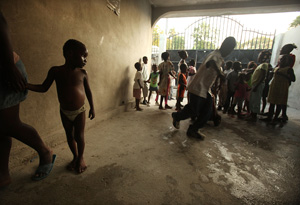
Photo: Mario Tama/Getty Images News
Before the Haiti earthquake in January, there were about 380,000 orphans in Haiti. Today, experts estimate there are more than 1 million. The conditions are dangerous. There is little food and water, widespread disease and the threat of vulnerable children being sold into slavery.
Baptist aid workers from Idaho made headlines when they were arrested for trying to take 33 children out of Haiti without permission, sparking a debate about what is best for the orphaned children of Haiti.
Oprah Show correspondent Lisa Ling spent time with a family who has adopted a 7-year-old girl from Haiti for a closer look at what adoption means for the child and her new parents.
Baptist aid workers from Idaho made headlines when they were arrested for trying to take 33 children out of Haiti without permission, sparking a debate about what is best for the orphaned children of Haiti.
Oprah Show correspondent Lisa Ling spent time with a family who has adopted a 7-year-old girl from Haiti for a closer look at what adoption means for the child and her new parents.
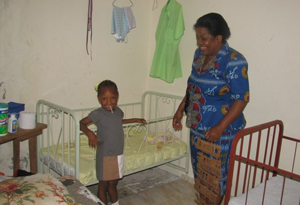
With two grown children and one teenager at home, Debbie and Scott were nearly empty nesters when they decided to take a mission trip to Haiti. "We really weren't looking to adopt, period, and certainly not from Haiti," Scott says. "Claire was the first little Haitian girl that we saw, and our hearts just connected. It was really a surreal thing. We bonded, we fell in love, and at that point, we knew that there was a real future here with this little girl."
Three years after starting the adoption process, the earthquake hit. It took a week for Debbie and Scott to be notified that 7-year-old Claire was alive and healthy. "It actually sped things up," Scott says. "We probably still wouldn't have her if the earthquake hadn't have hit. But we were able to get her out through a humanitarian aid visa."
In January 2010, Debbie and Scott welcomed Claire into her new home.
Three years after starting the adoption process, the earthquake hit. It took a week for Debbie and Scott to be notified that 7-year-old Claire was alive and healthy. "It actually sped things up," Scott says. "We probably still wouldn't have her if the earthquake hadn't have hit. But we were able to get her out through a humanitarian aid visa."
In January 2010, Debbie and Scott welcomed Claire into her new home.
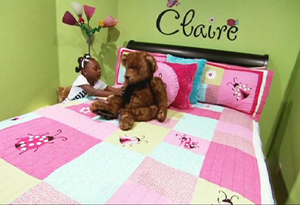
Claire's new life is a far cry from where she lived in Haiti. Instead of an overcrowded orphanage, Claire now lives in a 4,000-square-foot home with a private lake. She used to share a twin bed with four other girls. Now, she has a queen-size bed to herself and a lawn to run around on.
In Haiti, Claire would get just one meal a day—a mound of rice and beans. Debbie says the abundance of food in her home has been a big change for Claire. "Her stomach gets hugely extended, and she ends up throwing up if she eats too much," Debbie says. "Until she knew that she was going to get another meal, every mealtime was awful with her. It was this constant battle of how much food she can eat."
Debbie says Claire has also had challenges adjusting to school and other children. "She's very aggressive, and in Haiti they grow up learning to shove, push, kick, slap, whatever they need to do to get what they want. It's survival," Debbie says. "It's what we call their coping skills living in Haiti. So obviously that behavior does not work here."
Debbie and Scott have also had to adjust to their new lifestyle. "I would be lying if I was to say it hasn't been difficult, because it has," she says. "But the rewards have been far greater."
In Haiti, Claire would get just one meal a day—a mound of rice and beans. Debbie says the abundance of food in her home has been a big change for Claire. "Her stomach gets hugely extended, and she ends up throwing up if she eats too much," Debbie says. "Until she knew that she was going to get another meal, every mealtime was awful with her. It was this constant battle of how much food she can eat."
Debbie says Claire has also had challenges adjusting to school and other children. "She's very aggressive, and in Haiti they grow up learning to shove, push, kick, slap, whatever they need to do to get what they want. It's survival," Debbie says. "It's what we call their coping skills living in Haiti. So obviously that behavior does not work here."
Debbie and Scott have also had to adjust to their new lifestyle. "I would be lying if I was to say it hasn't been difficult, because it has," she says. "But the rewards have been far greater."
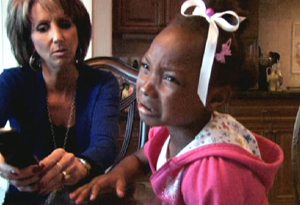
Each week, the family calls Claire's former orphanage to keep her connected to the only life she's ever known. Claire is able to speak to the woman who ran the orphanage, as well as her best friend.
Still, the calls can be difficult. "The first week, I remember praying with her at night and she just started breaking down and crying, as she was praying for all the kids over there," Scott says. "I think she misses them."
At first, Debbie says Claire was afraid she might have to go back to Haiti. "My daughter Ashley, who is in Haiti right now, told Claire that she was leaving," Debbie says. "She asked Claire if she wanted to go with her and she said, 'Oh, no, no. Claire no Haiti.'"
Still, the calls can be difficult. "The first week, I remember praying with her at night and she just started breaking down and crying, as she was praying for all the kids over there," Scott says. "I think she misses them."
At first, Debbie says Claire was afraid she might have to go back to Haiti. "My daughter Ashley, who is in Haiti right now, told Claire that she was leaving," Debbie says. "She asked Claire if she wanted to go with her and she said, 'Oh, no, no. Claire no Haiti.'"
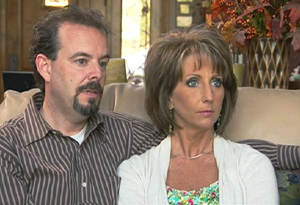
Debbie and Scott say they've received some criticism about their decision to adopt a child of another race from a foreign country. "Color doesn't matter, ethnic background," Scott says. "If there's children suffering, just because we're white doesn't mean we should just sit around and not do anything."
Debbie says she has been shocked to find that not everyone in the community is accepting of the decision to adopt a child of another race, but that she will teach Claire that love is colorblind. "Our goal is to teach her, as well as we've taught all of our children, just to love unconditionally," Debbie says. "It doesn't matter what the color of your skin. It doesn't change who you are."
Debbie and Scott have also received criticism because Claire's biological parents are still alive. "She was given up at a real early age, 1 year old, simply because the family could not provide for her. She was malnourished," Scott says. "So taking her out of that environment, even though she had biological parents, was the best thing for her."
Debbie and Scott say they will take Claire back to Haiti when and if she's ready to go. In the meantime, they keep a photo of her biological family next to her bed. "We just want to make sure that she constantly remembers her family," Debbie says. "Just to have them very present in her life as best we can."
Debbie says she has been shocked to find that not everyone in the community is accepting of the decision to adopt a child of another race, but that she will teach Claire that love is colorblind. "Our goal is to teach her, as well as we've taught all of our children, just to love unconditionally," Debbie says. "It doesn't matter what the color of your skin. It doesn't change who you are."
Debbie and Scott have also received criticism because Claire's biological parents are still alive. "She was given up at a real early age, 1 year old, simply because the family could not provide for her. She was malnourished," Scott says. "So taking her out of that environment, even though she had biological parents, was the best thing for her."
Debbie and Scott say they will take Claire back to Haiti when and if she's ready to go. In the meantime, they keep a photo of her biological family next to her bed. "We just want to make sure that she constantly remembers her family," Debbie says. "Just to have them very present in her life as best we can."
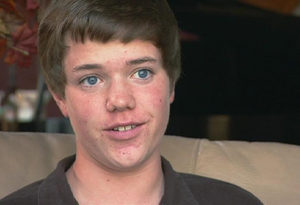
Claire isn't the only child adjusting to the situation. Debbie and Scott's son, Brandon, is also getting used to the idea of having a little sister around. "It has been hard," he says. "Claire gets all the attention right now."
Debbie and Scott say they're working hard to spend time with each child. "Our children are older so I think it's easier for them to understand when we explain it to them," Scott says. "But they're actually more like parents than brother or sisters and we have to, as parents, be conscious of that and try to carve out some one-on-one time with each of them. We've always done that and we'll continue to do that."
Debbie and Scott say they're working hard to spend time with each child. "Our children are older so I think it's easier for them to understand when we explain it to them," Scott says. "But they're actually more like parents than brother or sisters and we have to, as parents, be conscious of that and try to carve out some one-on-one time with each of them. We've always done that and we'll continue to do that."
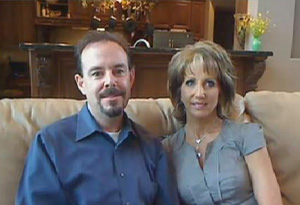
As of May 2010, no Haitian adoptions are being processed unless they had begun before the earthquake. "It's important to note Debbie and Scott did it the right way and they had been trying to adopt Claire for years," Lisa says. "After the earthquake hit, there was just a loss of control. And it is an instinct, I think, when you see these children who are so desperate, you want to bring them home."
Through it all, Debbie and Scott say they have no regrets. "She's flourishing under that constant love and nurturing that she's getting here," Debbie says. "I've never seen her happier. It's just really been a beautiful thing."
Wyclef Jean's visit to Haiti
President Bill Clinton's hope for Haiti
Through it all, Debbie and Scott say they have no regrets. "She's flourishing under that constant love and nurturing that she's getting here," Debbie says. "I've never seen her happier. It's just really been a beautiful thing."
Wyclef Jean's visit to Haiti
President Bill Clinton's hope for Haiti



